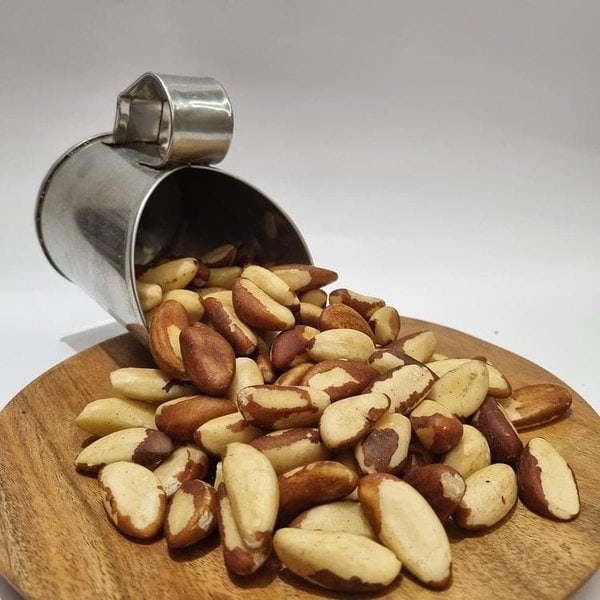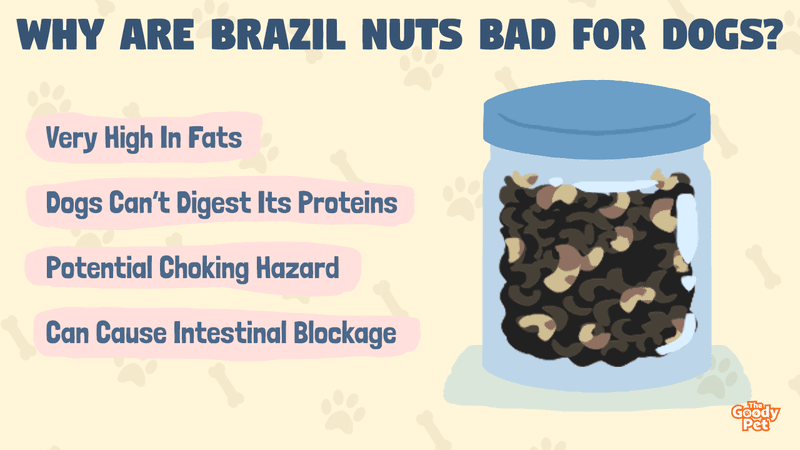Tossing some tidbits of human food to pups is a great way to share our best moments with canines. But it isn’t always a healthy practice. Human foods can be safe or unsafe for dogs to eat. It’s for you to know what works for your Fido. But can dogs eat Brazil nuts?
Yes, dogs can eat Brazil nuts. However, Brazil nuts aren’t a healthy snack for pups because they are very high in fats. So, their consumption will result in dogs eating more fat than necessary, making pancreatitis a likely condition. As such, we highly recommend avoiding feeding dogs Brazil nuts.
Brazil nuts are super healthy for humans. But there are tons of reasons why they shouldn’t feature in your dog’s diet. A close walk with us will equip you with more knowledge on why it’s never a wise idea to offer Brazil nuts as treats to dogs.
Should Dogs Have Brazil Nuts?
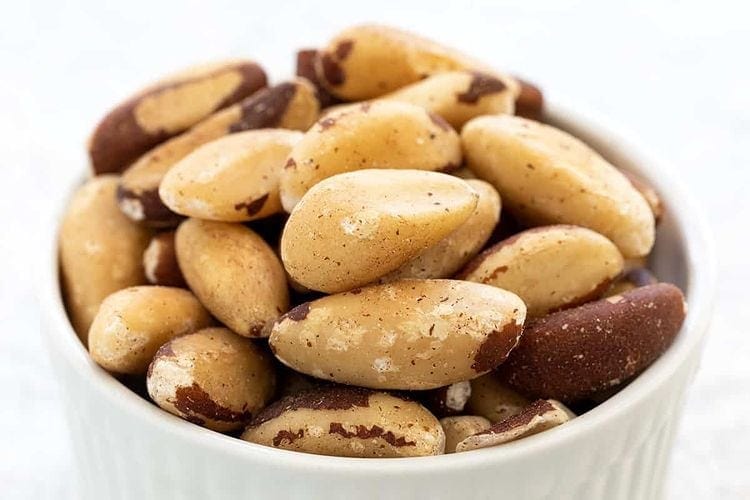
Dogs shouldn’t have Brazil nuts in whatsoever circumstance. While a super-food for humans, Brazil nuts pose several health risks to canines, with the sources of danger ranging from the size of the nuts to their nutritional composition.
If we were to create a list of healthy treats for humans, Brazil nuts would take one of the top spots. These nuts do a world of good to our health just as much as to our taste buds. However, to our furry friends, Brazil nuts aren’t healthy.
Now, are you wondering what makes Brazil nuts bad for canines? Could it be they contain something poisonous? What happens when dogs eat them? Well, we have all the answers to these queries coming within our coverage. However, before we respond to them, let’s first look at whether or not Brazil nuts make for a healthy treat for puppies.
Can Puppies Eat Brazil Nuts?
No, puppies can neither eat Brazil nuts. Actually, Brazil nuts are even more dangerous for young dogs than older dogs. That’s because smaller dogs have narrower passageways than older dogs, so problems are likely to emanate not just from the nut constituents but also the size of the nuts.
You see, in case you didn’t know, there are a few foods mature dogs can handle that the young ones can’t. For instance, grown-up dogs can safely feast on some bones and other foods too “mature” for newborns’ delicate digestive systems.
In the same way, puppies can safely eat some foods that older dogs can’t. Let’s take dairy products as an example. Unlike grown-up dogs, puppies have lactase, the enzyme to digest lactose in dairy products.
That’s why small dogs can safely eat milk and other dairy products. But the production of this enzyme ceases with advancement in age, explaining why older dogs can’t eat milk-related products.
And now, growing and mature dogs face a similar type of risk with Brazil nuts. In fact, as we’ve said, for puppies, the source of danger extends beyond the mere inability to digest – young dogs are more likely than adult dogs to get choked by Brazil nuts.
Are Brazil Nuts Poisonous To Dogs?
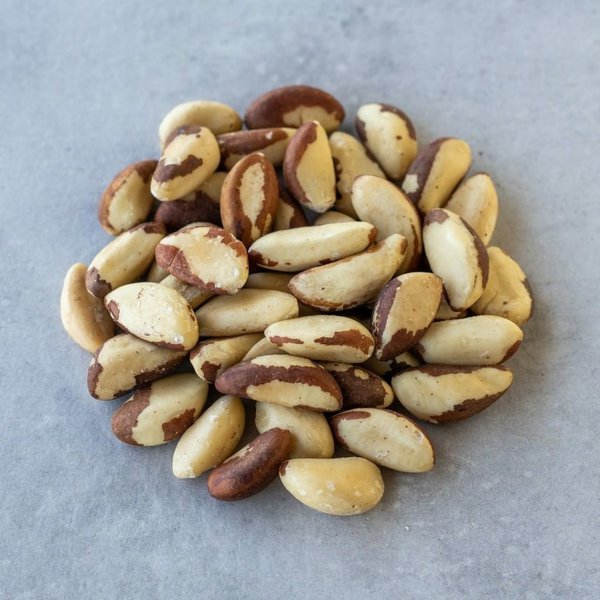
No, Brazil nuts aren’t poisonous to dogs. While generally harmful and unhealthy for canines to eat, Brazil nuts don’t contain any toxins. Nevertheless, the absence of poison alone doesn’t qualify them to feature on the list of things you can offer your dog.
As you could be aware, there’s a pronounced distinction between a human body system and a canine’s. That’s why we have some food constituents safe for humans but deadly for dogs at the same time. But Brazil nuts don’t contain harmful toxins to dogs.
Here, no fear of xylitol, theobromine, and other compounds dangerous to dogs that you are likely to find in human food. As such, your dog will, most of the time, not develop poisoning complications after they eat Brazil nuts.
Why Are Brazil Nuts Bad For Dogs?
Brazil nuts are bad for dogs because they can do more harm than good to their health. When eaten, Brazil nuts put dogs on the path of chronic diseases like obesity, especially when these treats are fed to dogs regularly.
So yes, as much as they are tasty and we love them, Brazil nuts aren’t the perfect treat to toss to dogs. Don’t even take the least amount of risk – and for a good reason. That will do you and your dog a world of good.
Let’s now look at the four main reasons you shouldn’t give your dog Brazil nuts;
Too Rich In Proteins And Fats
Proteins and fats are undoubtedly two essential nutrients for dogs. In fact, 10% of an adult’s dog calories should come from proteins and 5.5% from fats. Puppies need even more than that for healthy growth.
And with that said, any food rich in these two nutrients is healthy for dogs, right? Well, not really! As much as dogs so much need proteins and fats in their diet, our furry friends are disadvantaged in one way – they can’t digest some proteins just as well as humans can.
And yes, a case in point, dogs can’t properly digest these proteins in Brazil nuts. That’s the same with almond nuts and several other types. As such, our fur babies are likely to develop digestive issues from these nuts. So yes, if you have to offer your dog a snack, which of course, is an essential thing to do, just let it not be Brazil nuts.
Again, Brazil nuts are very high in fats. Fats are generally good for dogs. But that’s not always the case. The amount of fat in Brazil nuts is just too high for canines’ bodies to handle. And as we all know, too much of anything good can be harmful.
To bring you to perspective, every ounce of Brazil nuts offers 0.67 ounces of fat. That’s to say that two-thirds of a Brazil nut goes to fats. Again, an ounce of these nuts has a whopping 186 calories, much more than you will find in most dog treats. That makes it extremely likely for dogs to gain weight rapidly from eating Brazil nuts.
And just so you know, dogs are prone to obesity. In fact, a few days of exceeding your dog’s daily caloric requirement is at times, all it takes to make them obese. That’s why most vets will repeatedly insist on keeping a close check on the number of calories your dog eats.
A Potential Choking Hazard
Brazil nuts come in just the right size to cause choking, especially in puppies and smaller dog breeds. Young and pint-sized dog breeds have a narrower elementary canal, so the likelihood of choking is high.
You see, though puppies can handle more fats and proteins in their diet than adult canines, they still get the short end of the stick in some areas, for instance, in the size of their windpipes. The young furry friends have much thinner airways. As such, choking is more likely when they eat Brazil nuts.
Can Cause Intestinal Blockage
Other than choking, ingestion of Brazil nuts can lead to an obstruction in the intestines. An intestinal blockage is much like choking in that it causes obstruction. However, unlike choking, the obstruction, in this case, affects the passing of food and not air.
Intestinal blockage is more likely in smaller dogs than larger dogs for the same reason as choking, i.e., thinner passageways. However, when talking about intestinal obstruction, it has something to do with narrower digestive tracts and not airways.
Can Contain Aflatoxins
As aforesaid, Brazil nuts themselves don’t contain anything toxic in them. But don’t let that fool you – as harmless as that sounds, these man’s favorite treats can still have some dangerous contaminants.
Yes, much like other nuts, Brazil nuts can have aflatoxins contamination! This type of mycotoxin will happen between the time the nuts fall from the parent tree (Bertholletia excelsa) to when they reach the final consumer.
When dogs ingest anything containing aflatoxin, they may experience jaundice, loss of appetite, sluggishness, vomiting, and other signs. And as we all know, aflatoxins are among the most carcinogenic substances on earth. So yes, cancers also feature on the list of possibilities after dogs eat Brazil nuts containing these elements.
What Happens If A Dog Eats One Brazil Nut?
Usually, nothing will happen when a dog eats one Brazil nut. However, that doesn’t make it safe for them – a Brazil nut could still cause choking and intestinal obstruction in dogs, especially for small canines with narrower digestive tracts.
Most of the risks of eating Brazil nuts only come with ingesting significant amounts for extended periods. But we still have some short-term consequences of dogs eating these nuts, and choking is one of them.
Brazil nuts are more likely than most types of nuts to cause choking and intestinal blockage in dogs. As earlier said, that’s especially true in puppies and smaller dog breeds, but it can also occur in large canines, especially those with the habit of gulping food and treats.
Signs that your dog is choking include but are not limited to;
- Excessive salivation
- Coughing
- Blue mucus membranes
- Rubbing of face against another surface, especially ground
- Pawing at mouth
- Distress
Where the nut causes blockage in the intestines, you can also tell by looking out for some of the implications of obstruction.
The signs of gastrointestinal blockage include;
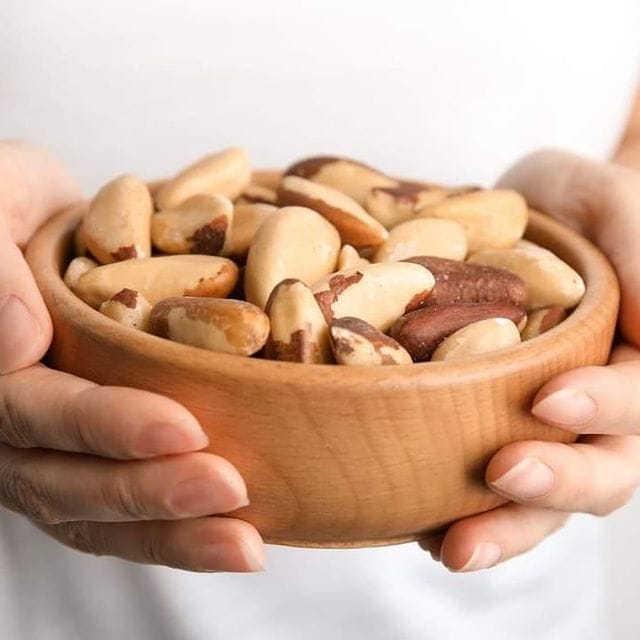
What Happens If A Dog Eats Brazil Nuts?
Much can happen if a dog eats Brazil nuts in plenty. Besides choking and intestinal obstruction, Brazil nuts can make dogs develop an upset stomach, pancreatitis, and a series of other life-threatening conditions.
So yes, it only gets worse with eating more. Your dog could experience short-term or long-term effects depending on the dog’s intake level and frequency.
In the short term, too much Brazil nuts will cause stomach upset, diarrhea, and other issues targeting digestive health. Of course, that’s in addition to choking and intestinal blockage. Whereas, in the long haul, Brazil nuts won’t only give your dog more weight – they can also cause dogs pancreatitis.
In the most straightforward terms, pancreatitis is the inflammation of the pancreas, the organ responsible for the secretion of several digestive enzymes.
Usually, when the pancreas releases digestive enzymes, they won’t become active until they reach the intestines. However, when pancreatitis strikes, things change; the enzymes gain effect immediately after they get released. That can make them digest the organ itself, causing severe damage.
Early signs of pancreatitis are less severe. In fact, you could easily mistake them for something minor. However, with time, things only get worse. Without prompt treatment, pancreatitis can cause death in dogs.
The initial signs of pancreatitis in dogs include;
- Loss of appetite
- Diarrhea
- Lethargy
- Fever
- Vomiting
However, as the situation intensifies, dogs are likely to experience;
- Abdominal pain
- Breathing difficulty
- Irregular heartbeats
- Collapse and shock
- Low body temperature
What Should You Do If Your Dog Eats Brazil Nuts?
What you should do is inform the vet immediately if you find your dog eating Brazil nuts. The dog professional will ask you for any visible signs and advise you on what to do accordingly.
We’ve said that Brazil nuts are usually not toxic to canines. However, that doesn’t mean you can sit back and watch what comes out of it. There’s a lot to worry about after dogs eat Brazil nuts, whether in tiny bits or large quantities.
As such, it’s always wise to reach the vet at once. The vet may want to know the amount ingested, the size of your dog, and perhaps your dog’s health record. All that will be to help the expert assess the level of risk.
From the assessment, the dog professional will advise on the next course of action as they see appropriate. The doctor may ask you to monitor your canine closely for any signs or find your way to the clinic.
